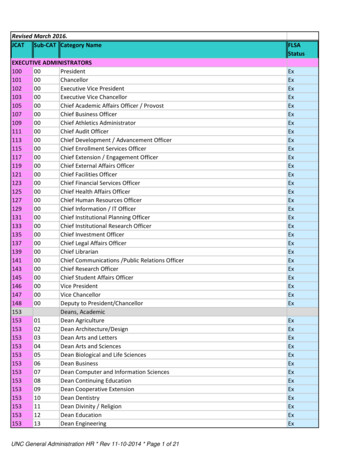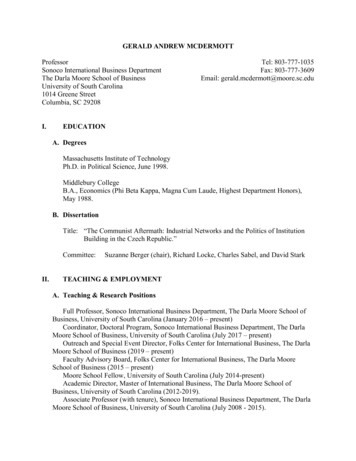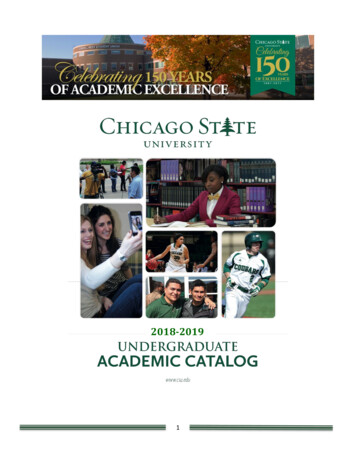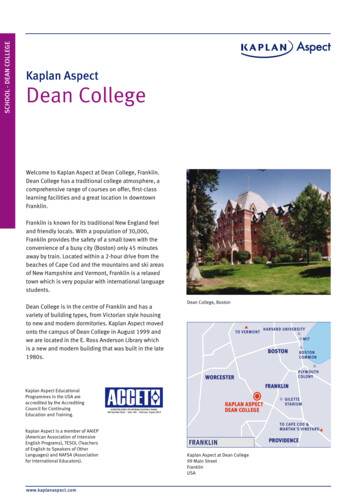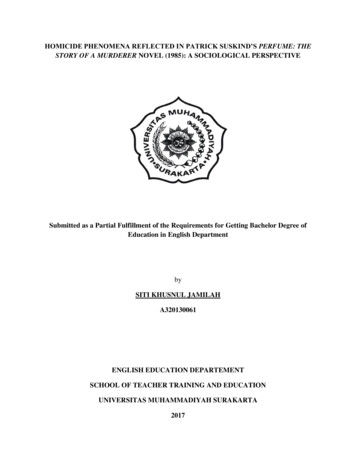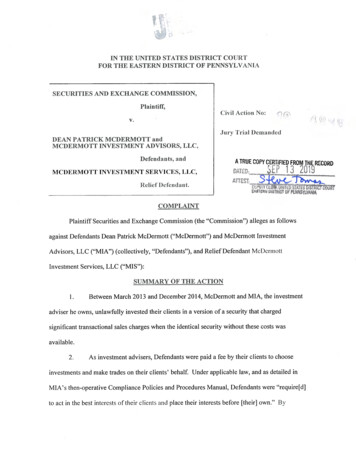
Transcription
( k,'1' P .W ,.IN THE UNITED STATES DISTRICT COURTFOR THE EASTERN DISTRICT OF PENNSYLVANIASECURITIES AND EXCHANGE COMMISSION,Plaintiff,Civil Action No:v.Jury Trial DemandedDEAN PATRICK MCDERMOTT andMCDERMOTT INVESTMENT ADVISORS,LLC,Defendants, andMCllERMOTT INVESTMENT S RVIC S,LLC,Relief Defendant.A TRUE y FY C R fI D FRONT THE RvCt RD . ; 1 2019A ' S J rs k r r o n '! '9 ' J fi' pi i i 't p PkNNSYtVANtNCOMPLAINTPlaintiff Securities and Exchange Commission (the "Commission") alleges as followsagainst Defendants Dean Patrick McDermott("McDermott") and McDermott InvestmentAdvisors, LLC("MIA")(collectively,"Defendants"), and Relief Defendant McDe -mottInvestment Services, LLC ("MIS"):SUMMARY OF THE ACTIONBetween March 2013 and December 2014, McDermott and MIA, the investmentadviser he owns; unlawfully invested their clients in a version of a security that chargedsignificant transactional sales charges when the identical security without these costs wasavailable.2.As investment advisers, Defendants were paid a fee by their clients to chooseinvestments and make trades on their clients' behalf. Under applicable law, and as detailed inMIA's then-operative Compliance Policies and Procedures Manual, Defendants were "require[d]to act in the best interests of their clients and place their interests before [their] own." By
causing their clients to pay these avoidable fees, Defendants violated their fiduciary duty to seekbest execution ofthese transactions on behalf of their clients.3.Defendants also violated their fiduciary duty by failing to disclose to their clientsthe conflict of interest inherent in these transactions: namely, that a version ofthe securitieswithout the transactional sales charges was available, and that the majority of the unnecessarytransactional costs incurred by Defendants' clients was paid to Relief Defendant MIS,McDermott's 100%-owned and controlled broker-dealer. McDermott, MIA, and MIS weredouble dipping by receiving both the advisory fees and the fees generated by the more expensivesecurities.4.By failing to seek best execution of the trades and failing to disclose the conflictsof interest inherent in these transactions, Defendants and Relief Defendant enriched themselvesat the expense of their clients and without their clients' knowledge.As a result of the conduct described in this Complaint, Defendants violated, andunless enjoined will continue to violate, Sections 206(1) and 206(2) of the Investment AdvisersAct of 1940 ("Advisers Act")[15 U.S.C. §§ 80b-6(1) and (2)]. Alternatively, with respect toDefendant McDermott, McDermott is liable under Sections 209(d) and (fl of the Advisers Act[15 U.S.C. §§ 80b-9(d) and (fl] for aiding and abetting MIA's violations of Section 206(1) and206(2) of the Advisers Act [15 U.S.C. §§ 80b-6(1) and (2)]. Furthermore, Relief Defendant MIShas been unjustly enriched as a result of the fact that it received the majority of the avoidablefees that Defendants' clients paid as a result of the fraud, to which it has no legitimate claim.JURISllICTION AND VENUEThe Commission brings this action pursuant to Sections 209(d) and 209(e) of theAdvisers Act [I S U.S.C. §§ 80b-9(d) and (e)] to enjoin such transactions, acts, practices, or
courses of business and to obtain disgorgement of all ill-gotten gains, prejudgment interest, andcivil penalties. The Commission further seeks any other relief as the Court may deem just andappropriate pursuant to Section 21(d)(5) ofthe Securities Exchange Act of 1934 [15 U.S.C. §78u(d)(5)].7.This Court has jurisdiction over this action pursuant to Sections 209(d), 209(e),and 214 ofthe Advisers Act[15 U.S.C. §§ 80b-9(d), 80b-9(e), and 80b-14].8.Venue in this District is proper pursuant to Section 214 ofthe Advisers Act[15U.S.C. § 80b-14]. Among other things, certain ofthe acts or practices constituting the violationsofthe federal securities laws alleged herein occurred within the Eastern District ofPennsylvania,and because, at all relevant times, McDermott and MIS were residents ofPennsylvania, andMcDermott, MIA, and MIS transacted business in the Eastern District ofPennsylvania.THE DEFENDANTS9.Mcllermott, age 59, resides in Pennsylvania and Florida. At all relevant times,McDermott was the principal and sole owner of both MIA and MIS. He served as the ManagingMember and Chief Compliance Officer for MIA and the Managing Member of MIS. In January1998, McDermott settled with the Commission, agreeing to the Commission's issuance of anorder requiring that McDermott cease and desist violations of Sections 17(a)(2) and (3) of theSecurities Act of 1933 arising out of his failure to conduct due diligence before sellinginvestments that turned out to be a Ponzi scheme engineered by his prior employer. SecuritiesAct Rel. No. 7502(January 30, 1998).10.MIA is a limited liability company that was organized in 2004 under the laws ofthe State of Florida. Its principal place of business is in Fort Myers, Florida, and it has variousother offices in Pennsylvania, Florida, New Jersey, and Maine. MIA has been a registered3
investment adviser with the Commission from approximately September 2006 to September2012, and from April 2014 to present, and with the State of Florida from approximatelySeptember 2012 to April 2014. During the relevant period, MIA advised between 100 andapproximately 350 clients, consisting mostly of individuals. From about approximately 2012 to2015, MIA's assets under management ranged from approximately 50 million to approximately 165 million.RELIEF DEFENDANT1 1.MIS is a limited liability company that was organized in 2010 under the laws ofthe Commonwealth ofPennsylvania and has been a registered broker-dealer since 2011. Itsprincipal place of business is in Bethlehem, Pennsylvania, and it has various branch offices inFlorida, California, New Jersey, Maine, Nebraska, Pennsylvania, Illinois, and Oregon.FACTSMcDermott's Control of MIA and MIS12.As 100% owner of MIA and MIS, McDermott had full control of both entities andsupervised the companies' various offices around the country. There was significantcommonality and overlap between MIA and MIS, as most ofthe individuals who worked forMcDermott were both investment advisers for MIA and registered representatives for MIS.Additionally, the two firms shared at least five different office locations, including theirrespective main offices.MIA's Advisory Services13.Although Defendants provided a number of different advisory services,McDermott and MIA regularly made and executed investment decisions on behalf of theiradvisory clients without prior notification or approval. Although each of the advisory accounts
was staffed with an MIA representative (at times McDermott himself, but in other cases anotherMIA adviser), McDermott frequently made the investment decisions, which were then appliedacross accounts.14.MIA's advisory clients paid MIA an advisory fee based on a percentage of assetsunder management. The advisory fee was paid each quarter and was determined by applying theaccount value on the first day ofthe quarter to a standard calculation. During the relevant timeperiod, the standard fee scale ranged from 1% to 2% annually based on the size ofthe account,although the fee could be negotiated to a lower amount.15.As investment advisers, and as detailed in MIA's then-operative CompliancePolicies and Procedures Manual (the "Compliance Manual"), Defendants were "require[d] to actin the best interests of their clients and place their interests before [their] own." Defendants werealso required to make full and fair disclosure of all material facts to their clients and had an"obligation to obtain best execution for [their] client.transactions." Defendants also stated in theCompliance Manual that: "[MIA]conducts its business with high ethical and professionalstandards consistent with applicable statutes, rules and regulations. In so doing,[MIA]recognizes its fiduciary duty to its clients and strives to conduct its business with the highestintegrity."The Unit Investment Trusts16.Among other investment products, McDermott and MIA invested in unitinvestment trusts("UITs") on behalf of their advisory clients. A UIT is an investment productwhere the creator, or "sponsor," chooses securities and deposits them into a trust fora predetermined period oftime, at the end of which the trust terminates.17.The UITs were available in two versions: (1)a fee-based version, made available
to advisory clients who were paying a periodic advisory fee, and (2)a standard version for retailbroker-dealer clients who were not in an advisory program and paid for services on a transactionby-transaction basis.18.Investors who purchased the more expensive, standard version ofthe UITsincurred two different charges. First, investors were charged a 0.50% "creation and developmentfee," which was paid to the UIT sponsor. Second, investors were charged a much moresignificant "transactional sales charge," the majority of which (approximately 90%) wasultimately paid to the broker-dealer making the trade, with the remainder being retained by thesponsor.19.However, investors working through an investment adviser and paying a periodicadvisory fee had the ability to purchase afee-based version ofthe UITs that chargedsubstantially less. In the fee-based version, the. transactional sales charges of2.45% or 3.45%were waived, and advisory clients only were required to pay the 0.50% creation and developmentfee to the UIT sponsor.Defendants Invested Advisory Clients in Standard UITs20.Between March of2013 and December of2014, Defendants purchased, inapproximately 169 advisory accounts, a total of558,975 units of standard UITs for 5,726,969.95 in total principal value. In most cases, Defendants purchased the same UIT forseveral advisory clients on the same day. In a few instances, Defendants purchased the sameUIT for more than 60 clients on the same day.21.McDermott ensured that the standard, rather than the lower cost fee-based,security identification number, or CUSIP, was entered for each purchase.22.McDermott's and MIA's decision to purchase the standard UITs caused MIA'sC
advisory clients to pay approximately 160,000 in avoidable transactional sales charges. Thisresulted in a substantial benefit to McDermott and MIS. Ofthe approximately 160,000 inavoidable transactional sales charges, the UIT sponsors paid McDermott's affiliated broker-,dealer MIS 143,37933 (approximately 90%)for acting as the introducing broker-dealer on thetransactions and retained the remaining approximately 10% to cover wholesale services.23.As the 100%-owner of both MIA and MIS, McDermott's decision to select thestandard UITs on behalf of his advisory clients allowed him to receive not only his MIA advisoryfee, but also transactional compensation in his capacity as the principal of MIS—all at theexpense of his clients.MIA Failed to Seek Best Execution and Failed to Disclose Conflicts of Interest24.Defendants knew or were reckless in not knowing that their fee-paying advisoryclients could have purchased the fee-based UITs, which would have avoided the transactionalsales charges and therefore offered the most favorable terms reasonably available under thecircumstances. Instead, by choosing to invest their clients in the more expensive standard UITs,Defendants violated their fiduciary duty to their clients by failing to seek best execution on thosetransactions on behalf of their clients.25.In addition, prior to engaging in these transactions, McDermott and MIA not onlyfailed to disclose to their advisory clients that there were transactional sales charges associatedwith the standard UIT investments—and that the majority ofthose charges would be remitted toMIS as the introducing broker-dealer on the transactions—but Defendants also failed to disclosethat a cheaper, fee-based version ofthe UIT was available to clients. Defendants violated theirfiduciary duty to their clients by failing to disclose this conflict of interest, which was a materialfact, and by putting their own interests ahead of those of their clients.7
26.McDermott admitted that Defendants' selection ofthe more expensive, standardUITs was intentional, and was done at the expense of his clients in order to generate revenue for .his affiliated broker-dealer. Defendants could have selected the fee-based UITs, but chose not todo so "[b]ecause MIS has overhead" and, given that McDermott and MIS did not chargeadvisory clients commission fees for equity transactions,"we ha[d] to make up the revenuesomeplace."27.MIA and McDermott, intentionally, knowingly, or recklessly, concealed that byselecting standard UITs which charged transactional sales charges, instead ofthe fee-based UITswhich had no such charges, McDermott and MIS would profit from the majority ofthetransactional costs.llefendants Violated the Federal Securities Laws28.McDermott and MIA are "investment advisers" within the meaning of Section202(a)(11) ofthe Advisers Act[15 U.S.C. § 80b-2(a)(11)] because, for compensation, theyengage in the business of advising others as to the advisability of investing in, purchasing, orselling securities.29.MIA is registered with the Commission as an investment adviser, and MIA andMcDermott each is in the business of providing investment advice concerning securities forcompensation.30.McDermott is also an investment adviser due to his ownership, management, andcontrol of MIA.31.As investment advisers, Defendants owe a fiduciary duty to their advisory clients.32.Among other things, Defendants owe their clients: (1)a duty to seek bestexecution for transactions they execute on behalf of their clients; and (2)a duty to disclose all
material facts, including conflicts ofinterest.33.Defendants violated the fiduciary duty they owe to their advisory clients by: (1)purchasing a version ofthe UITs that included an avoidable cost in the form oftransactionalsales charges, thus failing to seek best execution; and (2)failing to disclose to their advisoryclients that a cheaper, fee-based alternative ofthe same UITs was available, and that, when theyselected the standard version, McDermott's related broker-dealer, MIS, would obtain themajority ofthe transactional sales charge needlessly paid by the advisory clients.34.In connection with this conduct, Defendants used the mails or any means orinstrumentality of interstate commerce.TOLLING OF STATUTE OF LIMITATIONS35.Defendants McDermott and MIA and Relief Defendant MIS agreed to toll anystatute of limitations applicable to the claims alleged herein during the periods from Apri130,2017, through November 1, 2018.CLAIMS FOR RELIEFFIRST CLAIMViolations of Section 206(1)(Against Both Defendants)36.The Commission realleges and incorporates by reference each and everyallegation in paragraphs 1 through 35, inclusive, as if they were fully set forth herein.37.By engaging in the conduct described above, Defendants McDermott and MIAdirectly or indirectly, by use ofthe mails or the means or instrumentalities of interstatecommerce, while acting as an investment adviser, knowingly or recklessly employed devices,schemes, or artifices to defraud clients.38.By engaging in the foregoing conduct, Defendants McDermott and MIA violated and,
unless restrained and enjoined, will continue to violate, Section 206(1) ofthe Advisers Act [15U.S.C. §§ 80b-6(1)].SECOND CLAIMViolations of Section 206(2)(Against Both Defendants)39.The Commission realleges and incorporates by reference each and every allegation inparagraphs 1 through 35, inclusive, as if they were fully set forth herein.40.By eggaging in the conduct described above, Defendants McDermott and MIAdirectly or indirectly, by use ofthe mails or the means or instrumentalities of interstatecommerce, while acting as an investment adviser, knowingly, recklessly, or negligently engagedin transactions, practices, or courses of business which operated as a fraud or deceit upon clients.41.By engaging in the foregoing conduct, Defendants McDermott and MIA violatedand, unless restrained and enjoined, will continue to violate, Section 206(2) ofthe Advisers Act[15 U.S.C. § 80b-6(2)].THIRD CLAIMAiding and Abetting MIA's Violations of Sections 206(1) and 206(2)(Against Defendant McDermott)42.The Commission realleges and incorporates by reference each and every allegation inparagraphs 1 through 41, inclusive, as if they were fully set forth herein.43.By engaging in the conduct described above, MIA directly or indirectly violatedSections 206(1) and (2)ofthe Advisers Act [IS U.S.C. §§ 80b-6(1) and (2)].44.By ensuring that MIA's advisory clients purchased standard UITs with theadditional transactional sales charges, and failing to disclose the conflict of interest inherent inbuying a particular investment product on behalf of an advisory client to benefit himself and hiscompany, McDermott knowingly or recklessly substantially assisted MIA's violations of
Sections 206(1) and (2)ofthe Advisers Act[15 U.S.C. §§ 80b-6(1) and (2)].45.By reason ofthe foregoing, McDermott aided and abetted MIA's violations ofSections 206(1) and (2)ofthe Advisers Act[15 U.S.C. §§ 80b-6(1) and (2)] and, as aconsequence, McDermott is liable under Sections 209(d) and (fl ofthe Advisers Act[15 U.S.C.§§ 80b-9(d) and (fl].FOURTH CLAIMClaims with Respect to Relief Defendant(Against Relief Defendant MIS)46.The Commission realleges and incorporates by reference each and everyallegation in paragraphs.l through 41, inclusive, as if they were fully set forth herein.47.Relief Defendant MIS received payments, to which it does not have anylegitimate claim, from the UIT sponsors as a result ofthe transactional sales charges caused byMcDermott's and MIA's violations of Sections 206(1) and 206(2).48.Relief Defendant MIS obtained these ill-gotten gains described above as part, andin furtherance, ofthe securities laws violations alleged above, under circumstances in which it isnot just, equitable, or conscionable for it to retain the funds.49.By reason ofthe foregoing, Relief Defendant MIS has been unjustly enriched andmust disgorge,jointly and severally with Defendants, the amount of its ill-gotten gains.PRAYER FOR RELIEFWHEREFORE,the Commission respectfully requests that this Court enter a finaljudgment:I.Permanently restraining and enjoining Defendants.from, directly or indirectly, violating
Sections 206(1) and 206(2) ofthe Advisers Act [15 U.S.C. §§ 80b-6(1) and (2)];II.Ordering Defendants and Relief Defendant MIS to disgorge,jointly and severally, all illgotten gains or unjust enrichment derived from the activities set forth in this Complaint, togetherwith prejudgment interest thereon;III.Ordering Defendants to pay civil penalties pursuant to Section 209(e) of the Adviser Act[15 U.S.C. § 80b-9(e)]; andIV.Granting such other and further relief as this Court may determine to be just, equitable,and appropriate.Dated: September 13, 2019Respectfully submitted,rChristop er R. KellyJennifer Chun BarryAssunta VivoloMatthew S. RaalfAttorneys for PlaintiffSECURITIES AND EXCHANGECOMMISSION1617 JFK Blvd., Suite 520Philadelphia, PA 19103Telephone: (215)597-310012
McDermott ensured that the standard, rather than the lower cost fee-based, security identification number, or CUSIP, was entered for each purchase. 22. McDermott's and MIA's decision to purchase the standard UITs caused MIA's C advisory clients to pay approximately 160,000 in avoidable transactional sales charges. This
